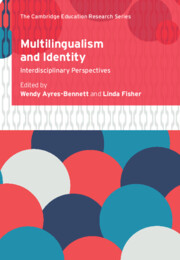Book contents
- Multilingualism and Identity
- Multilingualism and Identity
- Copyright page
- Contents
- Figures
- Tables
- Contributors
- 1 Towards Interdisciplinarity in Multilingual Identity Research
- Part I Situated Multilingualism and Identity
- 2 ‘Every Line Is a Lie’
- 3 Beyond ‘Narrating the Nation’
- 4 Metrolingual Practices and Distributed Identities
- 5 Migrants’ Identities in Multilingual Cities
- 6 Indexicalities in the Multilingual City
- 7 Multilingualism and Identity in Ningbo, China
- Part II Multilingual Identity Practices
- Part III Multilingual Identity and Investment
- References
- Index
6 - Indexicalities in the Multilingual City
Listeners’ Perceptions of Urban Vernacular French
from Part I - Situated Multilingualism and Identity
Published online by Cambridge University Press: 22 July 2022
- Multilingualism and Identity
- Multilingualism and Identity
- Copyright page
- Contents
- Figures
- Tables
- Contributors
- 1 Towards Interdisciplinarity in Multilingual Identity Research
- Part I Situated Multilingualism and Identity
- 2 ‘Every Line Is a Lie’
- 3 Beyond ‘Narrating the Nation’
- 4 Metrolingual Practices and Distributed Identities
- 5 Migrants’ Identities in Multilingual Cities
- 6 Indexicalities in the Multilingual City
- 7 Multilingualism and Identity in Ningbo, China
- Part II Multilingual Identity Practices
- Part III Multilingual Identity and Investment
- References
- Index
Summary
Contemporary Urban Vernacular (CUV) French is a way of speaking that is associated with the banlieues of French cities, settings which are often strongly multilingual. Drawing on focus-group methodology and indexicality theory, this chapter explores listeners’ perceptions of a series of linguistic features in relation to macro-social categories (such as gender, age, region and socioeconomic status) and the speech styles of particular groups of speakers. Our analysis demonstrates the fluid nature of the socio-semiotic values associated with linguistic features, highlighting the importance of the speech context (for example, whether a feature occurs in isolation or with other CUV features), the complex mix of social meanings associated with certain features, and the role played by the listener’s experience. Where an explicit link to the banlieue is identified, we find a group of interconnected stigmatizing associations. Our analysis underscores the importance of understanding the link between language practices and perceptions of social categories in contemporary France, where the power and prestige of ‘standard French’ remains considerable.
- Type
- Chapter
- Information
- Multilingualism and IdentityInterdisciplinary Perspectives, pp. 109 - 130Publisher: Cambridge University PressPrint publication year: 2022



